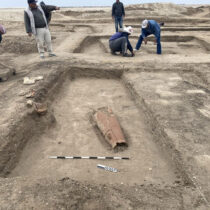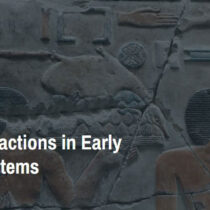The University of Nottingham organizes a conference on “Skilled Labour and Professionalism in Ancient Greece and Rome”, due to take place in Nottingham on 29th and 30th of June 2016.
Convener: Edmund Stewart
Abstracts for papers focussing on skilled labour and professionalism in any period of classical antiquity are warmly invited. This conference is intended to appeal to all those interested in the history of work and labour, its organisation and impact on the ancient economy and society.
The Greeks and Romans recognised the importance of skill (technē / ars) and were aware of the existence of a body of skilled workers. Recent scholarship has demonstrated an extensive division of labour in parts of the ancient economy. In many cases those practicing a skill did so on a regular basis and in exchange for coin or kind. Ancient authors, particularly Plato, draw frequent parallels between these groups of experts and they appear to share a common identity or label as specialist craftsmen. Are these workers professionals and, if so, what does the term mean in the context of the ancient world?
Professionalism is a modern term and applied almost exclusively to the modern world. Educated professionals form a crucial part of the modern economy. Recognised professional qualifications and membership of associations conveys valuable status and enable those judged worthy to practice specialised occupations, for which they may receive an income. This conference seeks to assess whether ‘professions’ and ‘professionals’ or their equivalents existed in antiquity, and whether ‘professionalism’ can be a useful term for studying the ancient economy and society.
Possible questions to consider are:
-Who were the professionals and how are they to be defined? They may include craftsmen, sculptors and artists, but also the ‘learned professions’, including doctors, seers and religious experts, philosophers, poets and other performers.
-How did the practice of a specialist professional skill affect their income, identity and social status? How is technē / ars presented in ancient texts? What methods do practitioners employ to demonstrate their grasp of their particular skill or its importance?
-Did these skilled artisans form the equivalent of a recognisable class within the ancient city? How did they interact with each other and other sections of society, especially their patrons among the elite? Issues for consideration may include evidence for ancient professional associations, the legal rights and privileges of professionals, patronage and payment.
Papers of approximately forty minutes would be most welcome on any of the questions and ancient professions outlined above. It is intended that the proceedings of the conference will be published in due course. Please send abstracts of no more than 300 words to [email protected] by the 2nd of November. Abstracts from postgraduate students are encouraged.
Research - Education: Call for Papers
Skilled Labour and Professionalism in Ancient Greece and Rome
University of Nottingham
11 Sep 2015
by Archaeology Newsroom
- A
- A
- A
Listen up




